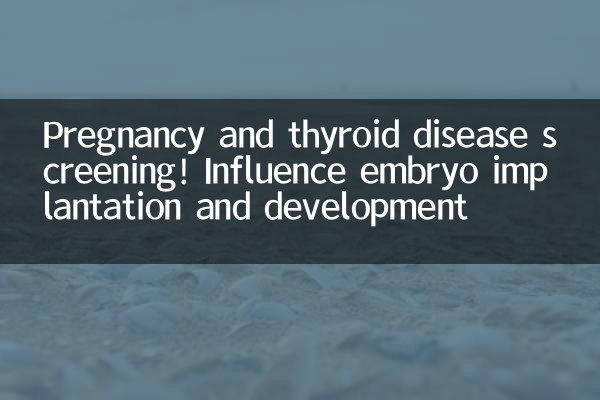Pregnancy and thyroid disease screening! Influence embryo implantation and development
In recent years, screening for pregnancy and thyroid disease has become a hot topic in the field of obstetrics and gynecology. Abnormal thyroid function not only affects the health of pregnant women, but may also have serious consequences for embryo implantation and development. This article will combine hot data from the past 10 days to structure the screening significance, epidemiological characteristics and clinical management suggestions of pregnancy combined with thyroid disease.
1. Epidemiological data on pregnancy and thyroid disease

| Disease Type | Prevalence | Effects on pregnancy |
|---|---|---|
| Clinical hypothyroidism | 0.3%-0.5% | Increased risk of miscarriage and impaired fetal neurodevelopment |
| Subclinical hypothyroidism | 2%-3% | May affect fetal intellectual development |
| Hyperthyroidism | 0.1%-0.4% | Increase the risk of miscarriage and premature birth |
| TPO antibody positive | 5%-15% | Increase the risk of miscarriage and premature birth |
2. The mechanism of influence of thyroid disease on embryo implantation
1.Abnormal thyroid hormone levels: Thyroid hormones are directly involved in periodic changes in the endometrium, and hypothyroidism can lead to dysplasia of the endometrium and affect embryo implantation.
2.Improper regulation imbalance: Thyroid autoantibodies may interfere with the immune tolerance of the maternal and fetal interface by activating the immune system and increasing the risk of embryo rejection.
3.Increased oxidative stress: Thyroid dysfunction can lead to increased oxidative stress levels, impairing oocyte quality and endometrial receptivity.
3. Suggestions for screening thyroid disease during pregnancy
| Screening items | The best time | Target group |
|---|---|---|
| TSH detection | Before pregnancy or 8 weeks before pregnancy | All women who plan to be pregnant or early pregnancy |
| FT4 detection | When TSH is abnormal | Pregnant women with abnormal TSH |
| TPOAb detection | Before pregnancy or early pregnancy | Those with a history of thyroid disease/family history |
4. The latest clinical management guide points
1.TSH control target: TSH in the early stage of pregnancy should be controlled at 0.1-2.5mIU/L, 0.2-3.0mIU/L in the middle stage of pregnancy, and 0.3-3.0mIU/L in the late stage of pregnancy.
2.Drug treatment plan: levothyroxine is the first choice for the treatment of hypothyroidism during pregnancy, and the dosage needs to be individually adjusted according to the TSH level.
3.Monitor frequency: Pregnant women diagnosed with thyroid disease should check thyroid function every 4 weeks until delivery.
V. Prevention strategies and health education
1.Pre-pregnancy consultation: It is recommended that all women of childbearing age, especially those who plan to be pregnant, undergo thyroid function assessment.
2.Iodine nutritional supplement: The daily iodine intake during pregnancy should reach 250μg, but thyroid dysfunction caused by excessive iodine supplementation should be avoided.
3.Identification of high-risk populations: People with a history of thyroid disease, family history, type 1 diabetes or other autoimmune diseases should be listed as key screening subjects.
Conclusion:Early screening and standardized management of pregnancy combined with thyroid disease are crucial to improving pregnancy outcomes. It is recommended that medical institutions include thyroid function testing in routine pre-pregnancy examinations and early pregnancy screening projects, and protect maternal and infant health through multidisciplinary collaboration.

check the details

check the details